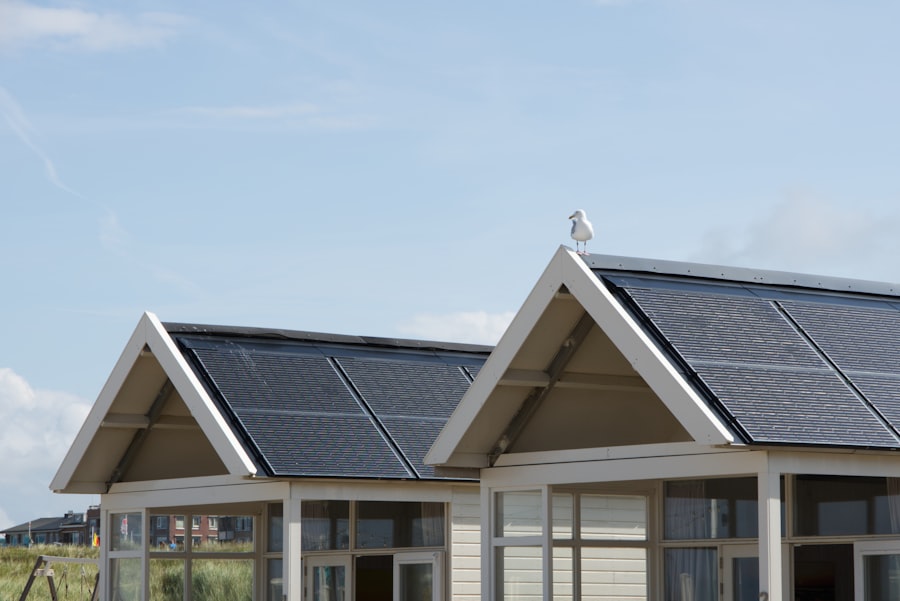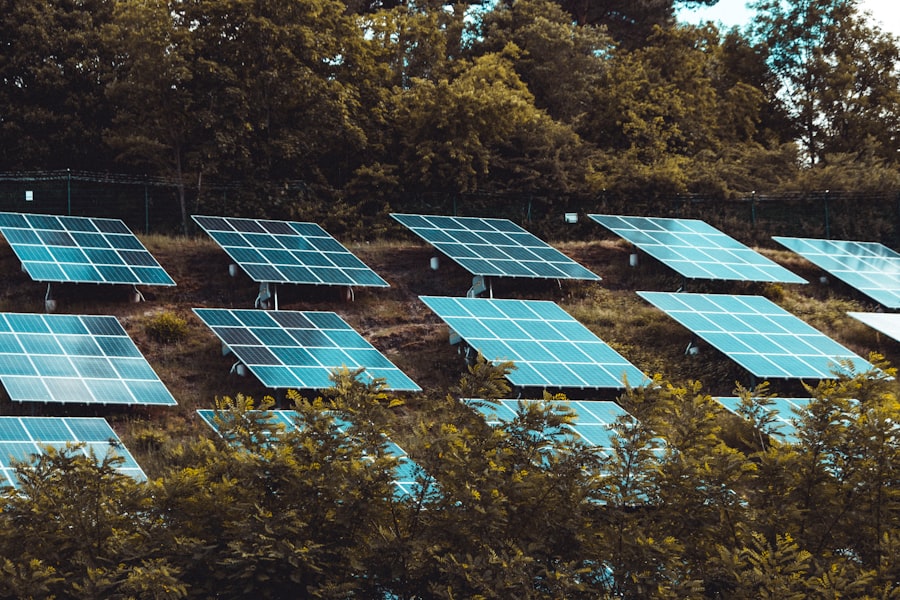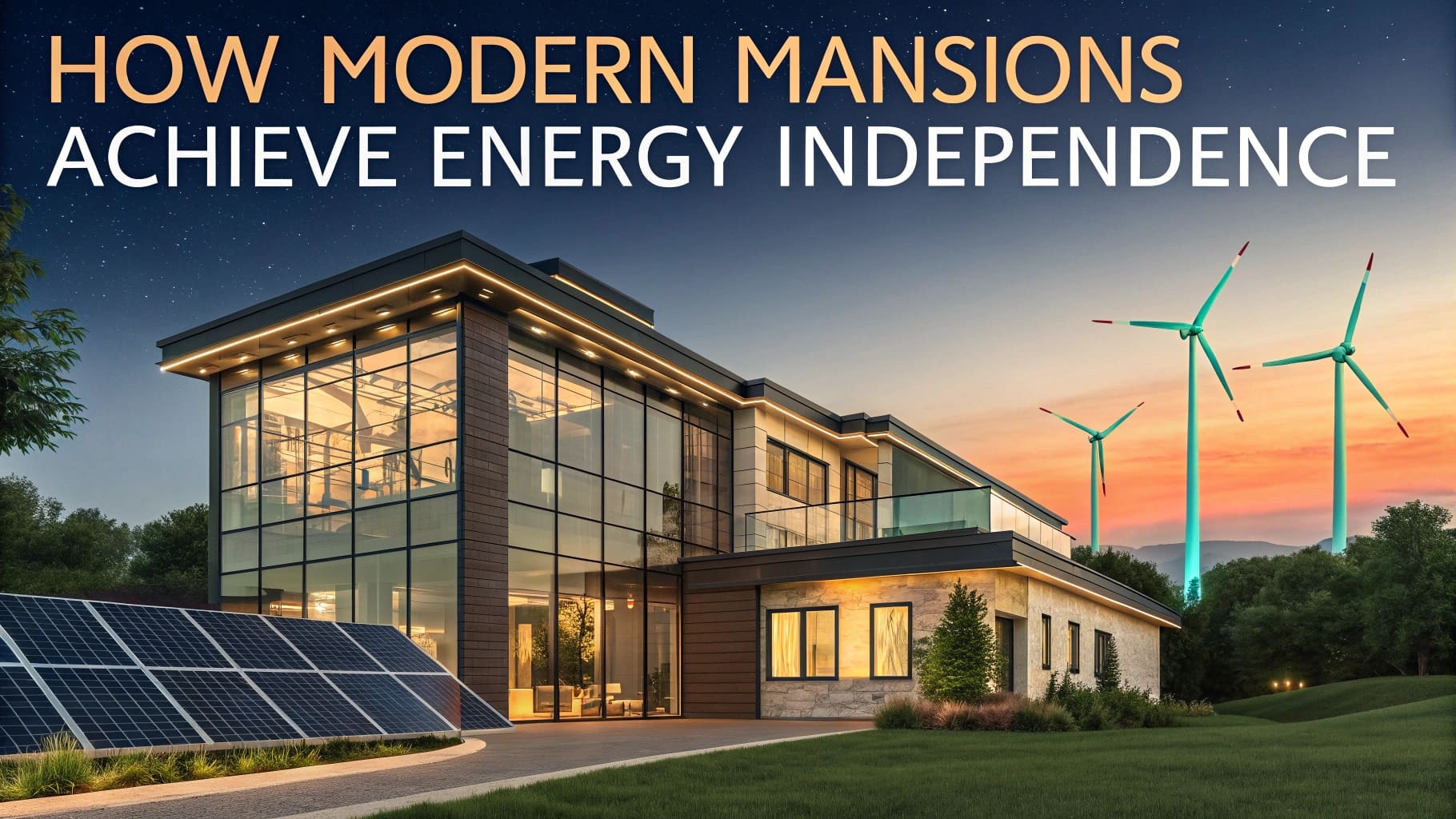In recent years, the concept of modern mansions has evolved significantly, transcending mere opulence to embrace sustainability and energy independence. These luxurious homes are no longer just symbols of wealth; they are increasingly becoming showcases of innovative technologies and eco-friendly practices. As the global conversation around climate change intensifies, homeowners and builders alike are recognizing the importance of reducing carbon footprints and promoting energy efficiency.
This shift is not only a response to environmental concerns but also a strategic move towards long-term financial savings and self-sufficiency. Modern mansions are now designed with an eye toward energy independence, integrating various renewable energy sources and advanced technologies. This transformation is driven by a combination of consumer demand for sustainable living and advancements in building technologies.
Homeowners are seeking to create spaces that reflect their values, prioritizing not just luxury but also responsibility towards the planet. As a result, these homes are equipped with features that allow them to generate, conserve, and manage energy more effectively than ever before.
Solar Power and Modern Mansions
Seamless Integration with Solar Roofing Materials
Many high-end homes incorporate solar roofing materials that blend with the architecture, eliminating the bulky appearance of traditional panels while maximizing energy production.
Financial Benefits and Incentives
The financial benefits of solar power are substantial. By generating their own electricity, homeowners can significantly reduce their reliance on grid power, leading to lower utility bills. In some cases, excess energy produced can be sold back to the grid, creating an additional revenue stream. Moreover, many regions offer tax incentives and rebates for solar installations, further enhancing the appeal of this renewable energy source.
Regional Incentives and Rebates
For instance, in California, homeowners can benefit from the California Solar Initiative, which provides cash rebates for solar installations, making it an attractive option for those looking to invest in energy independence.
Geothermal Heating and Cooling Systems

Geothermal heating and cooling systems represent another innovative approach to achieving energy independence in modern mansions. These systems utilize the earth’s stable underground temperature to regulate indoor climates efficiently. By tapping into this natural resource, homeowners can significantly reduce their reliance on conventional heating and cooling methods, which often consume large amounts of fossil fuels or electricity.
The installation of geothermal systems involves drilling deep into the ground to access the earth’s heat. This process can be complex and costly upfront; however, the long-term savings on energy bills can be substantial. For example, a geothermal system can reduce heating costs by up to 70% compared to traditional systems.
Additionally, these systems have a long lifespan—often exceeding 25 years—making them a wise investment for homeowners looking to enhance their property’s value while promoting sustainability.
Smart Home Technology for Energy Efficiency
The rise of smart home technology has revolutionized how modern mansions manage energy consumption. Home automation systems allow homeowners to monitor and control various aspects of their homes remotely, optimizing energy use in real-time. Smart thermostats, for instance, learn user preferences and adjust heating and cooling settings accordingly, ensuring comfort while minimizing waste.
Moreover, smart lighting systems can be programmed to turn off when rooms are unoccupied or adjust based on natural light levels throughout the day. This level of control not only enhances convenience but also contributes significantly to energy savings. For example, studies have shown that homes equipped with smart lighting can reduce energy consumption by up to 30%.
Additionally, integrating smart appliances that operate during off-peak hours can further decrease energy costs while promoting a more sustainable lifestyle.
Energy-Efficient Building Materials and Construction
The choice of building materials plays a crucial role in the energy efficiency of modern mansions. Sustainable construction practices prioritize materials that minimize environmental impact while enhancing the overall performance of the home. For instance, using reclaimed wood not only reduces deforestation but also adds character and uniqueness to a property.
Similarly, recycled steel and low-VOC (volatile organic compounds) paints contribute to healthier indoor air quality while reducing the carbon footprint associated with new construction. Insulation is another critical factor in energy-efficient design. Advanced insulation materials such as spray foam or cellulose made from recycled paper can significantly reduce heat loss in winter and keep homes cooler in summer.
This results in lower energy consumption for heating and cooling systems, further promoting energy independence. Additionally, high-performance windows with low-emissivity (Low-E) coatings can minimize heat transfer while maximizing natural light, creating a comfortable living environment without excessive reliance on artificial lighting or climate control.
Rainwater Harvesting and Greywater Systems

Incorporating rainwater harvesting and greywater systems into modern mansions is an effective way to promote water conservation alongside energy independence. Rainwater harvesting involves collecting rainwater from roofs and directing it into storage tanks for later use in irrigation or even indoor plumbing applications. This practice not only reduces reliance on municipal water supplies but also helps manage stormwater runoff, which can contribute to local flooding and water pollution.
Greywater systems recycle water from sinks, showers, and washing machines for non-potable uses such as landscape irrigation or toilet flushing. By reusing water that would otherwise go to waste, homeowners can significantly reduce their overall water consumption. For instance, a family of four can save thousands of gallons of water annually by implementing a greywater system.
The integration of these water-saving technologies not only supports sustainability efforts but also enhances the overall resilience of modern mansions against potential water shortages.
Wind Power and Modern Mansions
While solar power often takes center stage in discussions about renewable energy for homes, wind power is another viable option for modern mansions seeking energy independence. Small-scale wind turbines can be installed on large properties where space allows for effective wind capture. These turbines convert wind energy into electricity, providing an additional source of renewable power that can complement solar systems.
The feasibility of wind power depends on several factors, including local wind patterns and zoning regulations. In areas with consistent wind speeds averaging above 10 miles per hour, homeowners can benefit significantly from wind energy generation. For example, a residential wind turbine can produce enough electricity to power an entire home or even feed excess energy back into the grid.
As technology advances, vertical-axis wind turbines are becoming more popular due to their compact design and ability to capture wind from any direction, making them suitable for residential applications.
The Future of Energy Independence for Modern Mansions
As the demand for sustainable living continues to grow, modern mansions are poised to lead the way in achieving energy independence through innovative technologies and practices. The integration of solar power, geothermal systems, smart home technology, energy-efficient materials, rainwater harvesting, and wind power creates a comprehensive approach to reducing environmental impact while enhancing comfort and luxury. The future of modern mansions lies in their ability to adapt to changing environmental conditions while providing homeowners with the tools they need to live sustainably.
As more builders embrace these principles and consumers prioritize eco-friendly features in their homes, we can expect a significant shift in how luxury living is defined—one that harmonizes elegance with responsibility towards our planet.
FAQs
What is energy independence for modern mansions?
Energy independence for modern mansions refers to the ability of a home to generate its own energy through renewable sources, such as solar panels or wind turbines, and to reduce its reliance on traditional energy sources like electricity from the grid.
How do modern mansions achieve energy independence?
Modern mansions achieve energy independence through the use of renewable energy sources such as solar panels, wind turbines, and geothermal systems. They also incorporate energy-efficient design and technologies, such as high-performance insulation, LED lighting, and smart home automation systems.
What are the benefits of energy independence for modern mansions?
The benefits of energy independence for modern mansions include reduced energy costs, decreased reliance on traditional energy sources, lower environmental impact, and increased resilience in the face of power outages or disruptions to the grid.
Are there any challenges to achieving energy independence for modern mansions?
Challenges to achieving energy independence for modern mansions may include the upfront cost of installing renewable energy systems, regulatory and permitting hurdles, and the need for ongoing maintenance and monitoring of these systems. Additionally, the availability of renewable energy resources in a specific location may also pose a challenge.
What are some examples of modern mansions that have achieved energy independence?
There are numerous examples of modern mansions that have achieved energy independence through the use of renewable energy sources and energy-efficient design. These homes can be found in various locations around the world, showcasing a range of innovative technologies and sustainable building practices.

